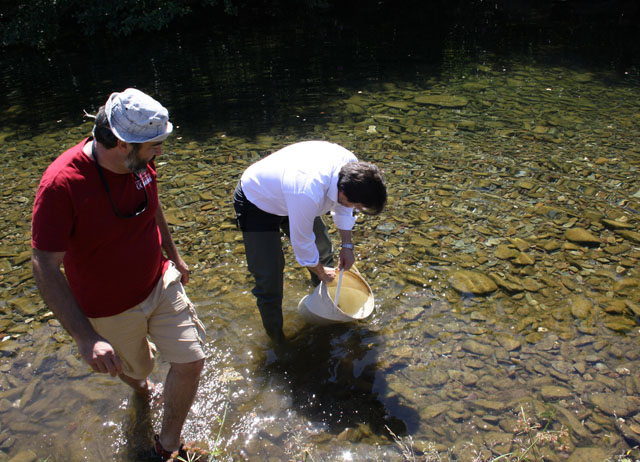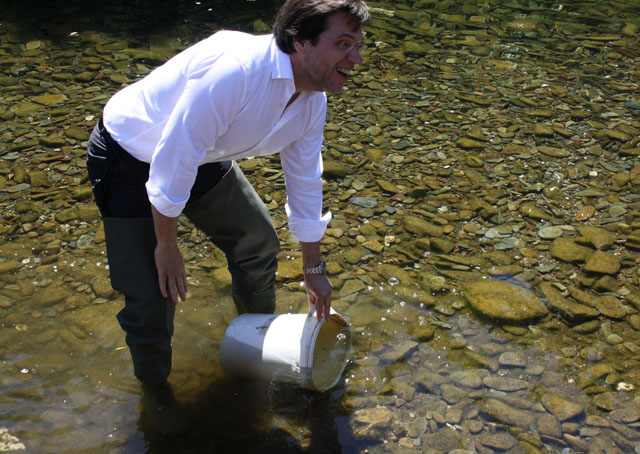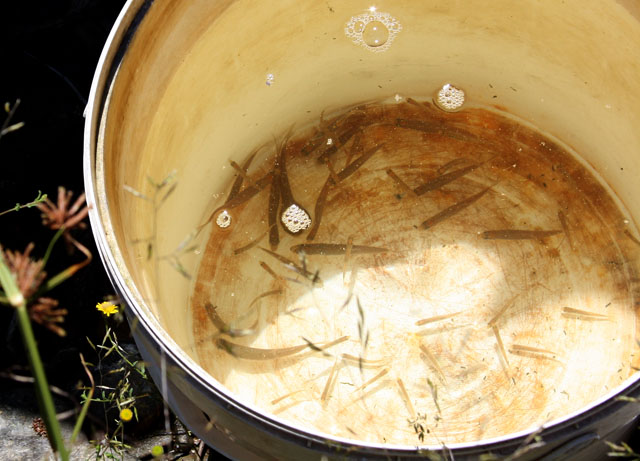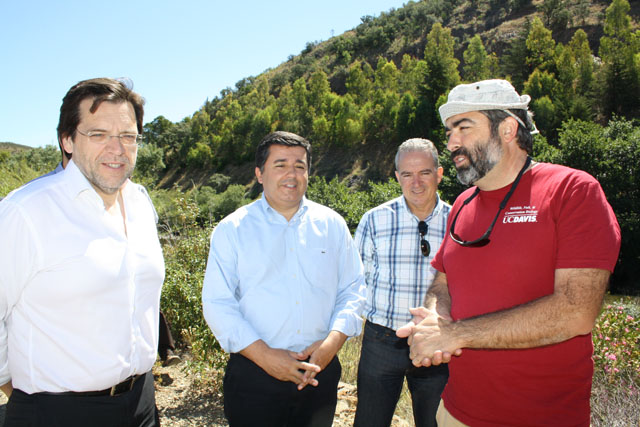 Tavira has 50 new ones since this Wednesday citizens which, despite not paying taxes, bring wealth to the council, in this case, environmental.
Tavira has 50 new ones since this Wednesday citizens which, despite not paying taxes, bring wealth to the council, in this case, environmental.
A group of saramugos, a species of small fish endemic to the Guadiana basin, «critically threatened with extinction», were returned to nature in the Odeleite stream, near the town of Monte da Ribeira, in Cachopo, their natural habitat, after to have been born and lived part of his life in captivity, in the Natural Park of Vale do Guadiana (PNVG).
The Secretary of State for Spatial Planning and Nature Conservation, Miguel Castro Neto, climbed the Serra do Caldeirão, put on his wellies and went into the water, to return the fish to nature. A moment that was joined by the president of the Tavira local authority Jorge Botelho and his councilors, as well as the team of technicians from the Vale do Guadiana Natural Park who have been successfully working on the captive breeding of saramugos.
 «One of our flags is the work that the Nature Conservation Institute has developed in the recovery of endangered species. This is an example of that. We are in a place where, at one time, there were many saramugos. Today it is the second basin with the largest population, but the number is relatively small», said the member of Government.
«One of our flags is the work that the Nature Conservation Institute has developed in the recovery of endangered species. This is an example of that. We are in a place where, at one time, there were many saramugos. Today it is the second basin with the largest population, but the number is relatively small», said the member of Government.
The saramugos have returned to the habitat that their ancestors are thought to have occupied "five million years ago", although today they are confined to different colonies, which will no longer have contact with each other "for 750 years", according to PNVG technician Sérgio Carrapato .
The small fish (an adult will be, on average, seven centimeters) only exists, moreover, in this border area of Baixo Alentejo, Algarve and Andalusia, but its reproduction in captivity is a feat that only technicians from the Natural Park based in Mértola they were able, despite attempts made across the border.
 The work being done in Mértola could be decisive in saving this species, which has been disappearing. The last extreme drought, recorded in 2005 and 2006, was particularly punishing for the then-known saramugo communities, causing them to halve, in a total of five locations. At the moment, it exists in the Vascão, Chanca, Odeleite, Ardila and Foupana rivers.
The work being done in Mértola could be decisive in saving this species, which has been disappearing. The last extreme drought, recorded in 2005 and 2006, was particularly punishing for the then-known saramugo communities, causing them to halve, in a total of five locations. At the moment, it exists in the Vascão, Chanca, Odeleite, Ardila and Foupana rivers.
«Our reference is a LIFE project carried out in 2000, by Professor Maria João Pereira, from the Faculty of Sciences of Lisbon, which identified the presence of the species in ten sub-basins of the Guadiana», he said. When new monitoring was carried out a few years later, they already only existed in these five locations.
Its disappearance is linked to prolonged periods of drought, also associated with «water abstraction, creation of dams, «which impede the progression and distribution of populations».
The preservation of this species will, moreover, be the target of a new LIFE project, led by the League for the Protection of Nature, which will also involve sensitizing the population to the presence of saramugos and the need to prevent the water from disappearing completely, in habitats of this species at the height of heat.
 Here, there may be some difficulty, as this is a little known fish, due to its scarcity and the fact that it is found in so few places.
Here, there may be some difficulty, as this is a little known fish, due to its scarcity and the fact that it is found in so few places.
«This is a small fish, so, from a gastronomic point of view, it doesn't have a great appetite to be consumed. In other words, people ended up preserving it, without knowing it. What was eaten was a close relative, the bordell or pardelha, which already reaches 12 centimeters and was eaten fried», revealed the technician from the PNVG.
The tranquility of the place where the saramugos were released, with the lapping of clear waters shaded by lush alders, contrasts with what was experienced in this place about two years ago. Monte da Ribeira and the neighboring towns were at the center of the great fire that ravaged the Serra do Caldeirão, although today, only a closer look will allow us to understand the consequences that the fire left behind.
«The countryside is green again, nature has done its work. We have already removed a lot of burnt material from this area and the private ones did too. Every day is an achievement», said the mayor of Tavira Jorge Botelho.
“What's important is that it doesn't burn anymore. And that there are more examples of these, in which nature is given importance, with the reinforcement of a colony of these fish, here in the municipality of Tavira. It is a sign that life must go on, always», he added.


















Comments